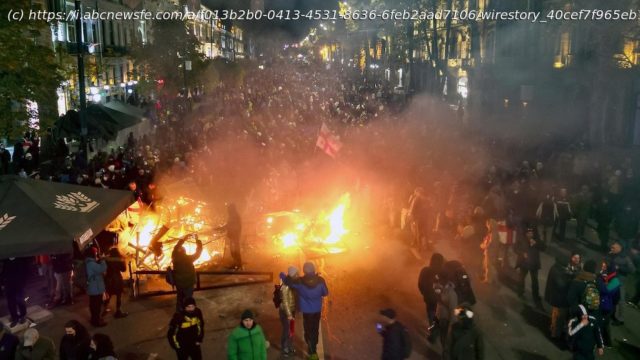Georgia has been facing a wave of protests against its government’s repressive policies
Almost every day for nearly a year, Gota Chanturia has joined rallies at Georgia’s parliament against the government and its increasingly repressive policies. He’s done this despite mass arrests and police violence against demonstrators.
And the civics teacher keeps marching even though he’s racked up an astonishing $102,000 in fines from the protests. That’s about 10 times what the average Georgian earns in a year.
“We’ve said that we will be here until the end, and we’re still here,” Chanturia told The Associated Press as he participated in yet another demonstration this week in the capital of Tbilisi.
The protests began when the government halted talks about joining the European Union. That move came after the longtime ruling party Georgian Dream won an election that the opposition alleged was rigged.
The rallies, big and small, continue despite a multipronged crackdown by the government through laws that target demonstrators, rights groups, nongovernmental organizations and independent media.
More protests are planned for this weekend to coincide with local elections.
The repression in the South Caucasus nation of 3.7 million has drawn comparisons to Georgia’s powerful neighbor and former imperial ruler Russia, where President Vladimir Putin has stifled dissent. Georgian Dream has been accused of steering the country into Moscow’s orbit of influence.
Human Rights Watch says Georgia is suffering a “rights crisis.” The clampdown is unprecedented in the country’s independent history and is escalating steadily, said Giorgi Gogia, the group’s Europe and Central Asia associate director.
But Georgia’s vibrant civil society is pushing back, and it has become a question of “who would blink first,” Gogia said. If it’s the public and civil society, they could wake up in an authoritarian country, „which would be a huge transformation from what Georgia used to be up until now,” he added.
Ketuna Kerashvili joined a rally in rainy Tbilisi on Wednesday despite the fact that her 30-year-old brother Irakli was arrested in December, convicted of disrupting public order, and sentenced to two years in prison. He had rejected the charges as unfounded.
Kerashvili told AP her brother’s trial was “tough to watch.”
“All of those boys and girls who are in prison now were trying to protect our country from pro-Russian forces and a pro-Russian government,” she said.
The violent crackdown escalated after largely peaceful protests in late November 2024, with over 400 people detained within two weeks; at least 300 reported severe beatings and other ill-treatment, according to Amnesty International.
Start
United States
USA — Science Georgia uses detentions, harsh measures to target anti-government protests






